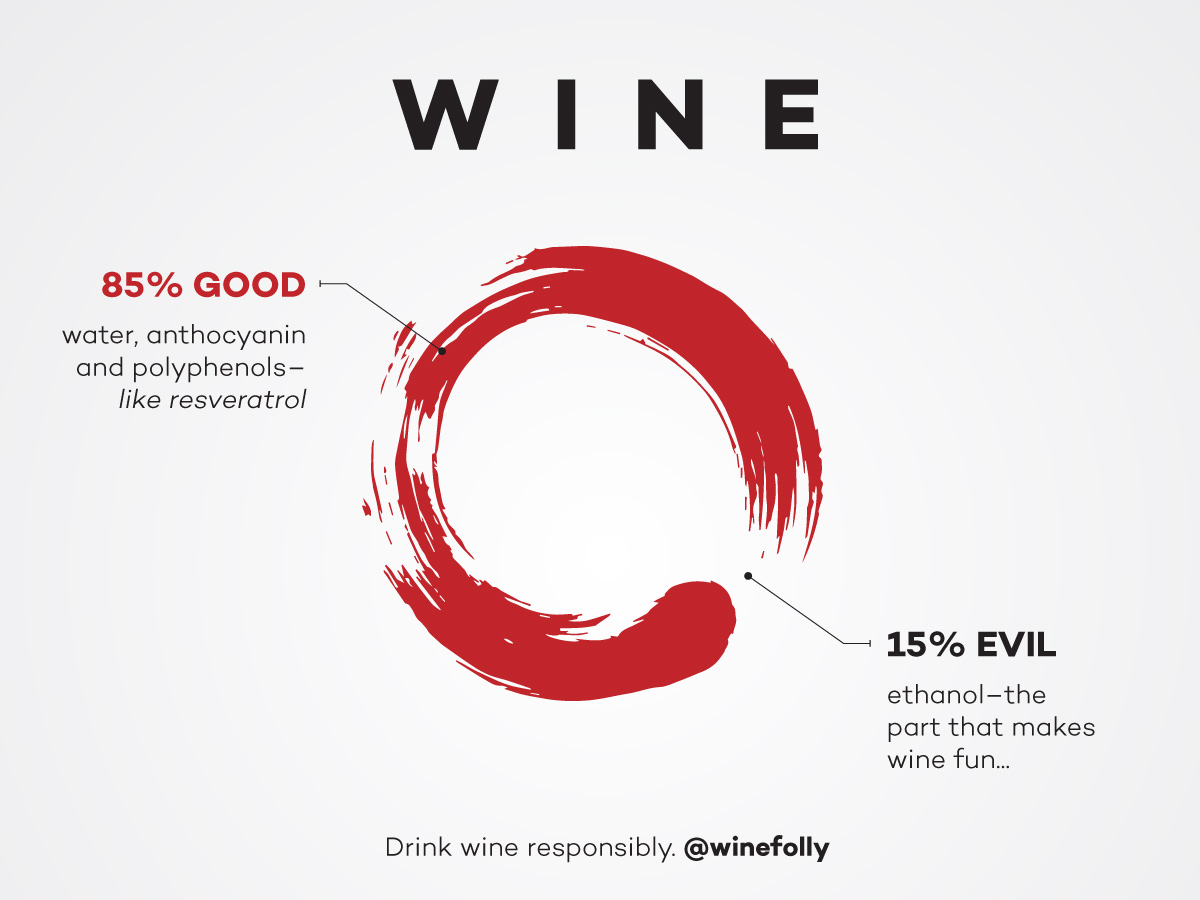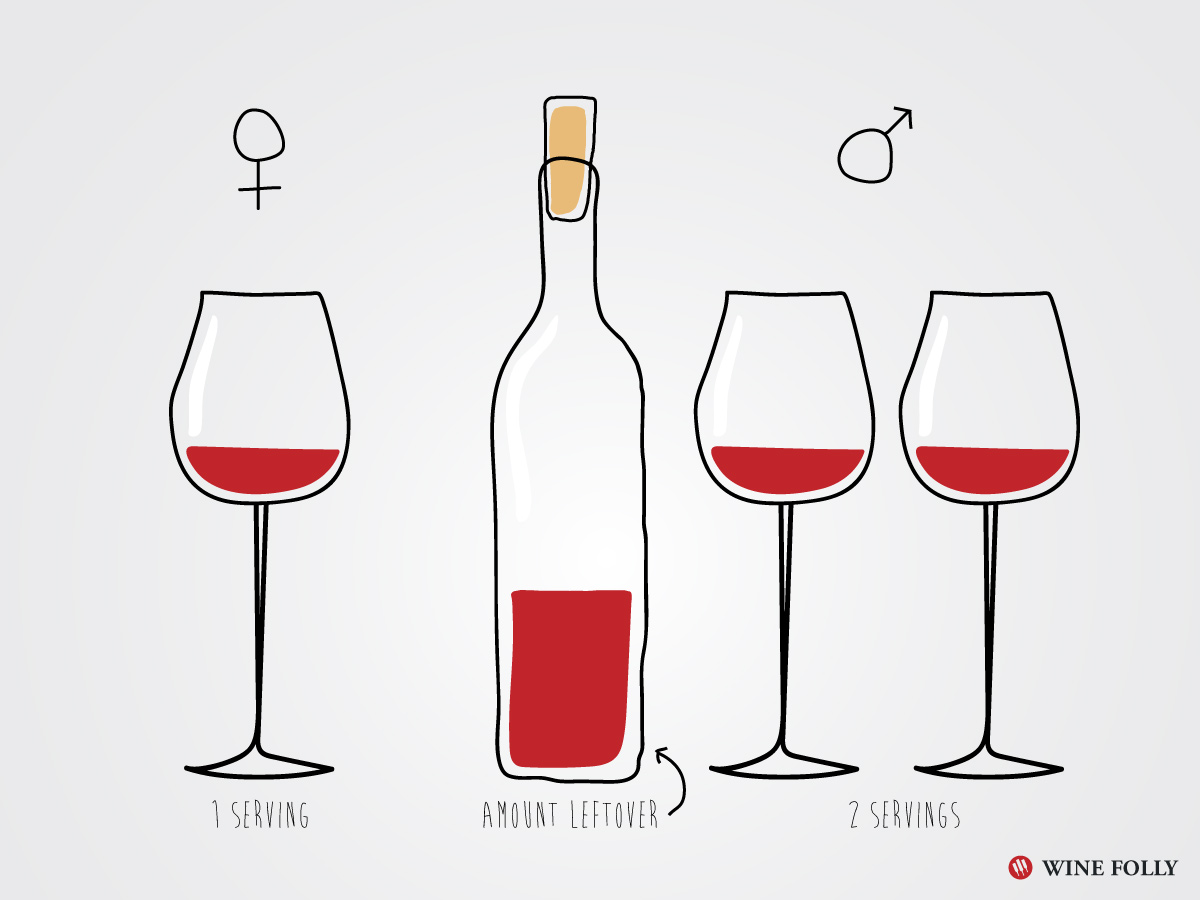Is Wine Healthy?
To really answer the question of whether or not wine is healthy, you need to look at what’s inside a glass of wine.

If 85% good plus 15% evil got you net zero, we’d all be drinking wine instead of water.
85% GOOD: Most of your glass includes stuff like water, anthocyanin (an antioxidant), and polyphenols (including tannin and resveratrol). All of these ingredients have been shown to be good for you.
15% EVIL: The freaky-deeky side of wine. Technically speaking, wine has anywhere from 5.5%–21.5% “evil” in the form of alcohol. Alcohol or ethanol happens to be a neurotoxin (it’s what makes you tipsy!), and when it’s metabolized in your liver it turns into a carcinogen called acetaldehyde. Of course, non-alcoholic wine is not as fun to drink.
What’s inside wine?
The calories in wine come from alcohol but wine contains some other things of interest. Here’s a quick reference guide what’s inside a bottle of wine.
What’s inside a bottle of wine?
Moderate Drinking is the Secret
Fortunately, if you’re hoping to keep your drinking habit at a healthy level, moderation is the secret.

The Definition of Moderate Drinking in the US
- Men: two 5 oz glasses of 12% ABV wine (~200 calories)
- Women: one 5 oz glass of 12% ABV wine (~100 calories)
No more than 7 drinks per week for women and no more than 14 drinks per week for men.
You might be wondering why men can drink more than women and there’s actually a scientific reason for this. As it happens, men have more of the enzymes needed to metabolize alcohol than women do by about a factor of two.
What’s the maximum amount I can drink in one day?
If you like wine, you’re going to let loose from time to time. I get that. But if you want to stay under the dreaded “excessive drinking” daily limit as indicated by the Dietary Guidelines for Americans (2015-2020) here’s what you should try to stick to:
- No more than 3 drinks in a single day for women
- No more than 4 drinks in a single day for men
Of course, you’ll still need to include the part where you drink no more than 7 drinks per week for women or 14 drinks per week for men. So throw in some alcohol-free days to make it work.

Get red flush? Your wine intake could be lower than the norm.
The Red Flush Factor
Do you get “red flush” when you drink? This happens usually just after one drink or less and sometimes make you break out in a rash. Some people even think they’re allergic to alcohol because of this reaction.
More than likely you have an acetaldehyde dehydrogenase deficiency, which means acetaldehyde builds up in your system quicker than others. It also makes you feel nauseous quicker too! If you’re curious to know if you have this deficiency, I found a pretty informative lineage chart on Wikimedia commons:
Basically, if your ancestral lineage contains one of the 2 green colored gene variants of aldehyde dehydrogenase, your body is more efficient at making acetaldehyde than people with the yellow gene variant.
More acetaldehyde means more sick to your stomach and more carcinogen in your body. This means, your wine intake should be lower than the norm.
Be Healthy: Stick To Your Limits
After doing the background research for this article, it seems like moderate drinking is the only smart thing to do.
So, inspired by my own work to prove moderate drinking is possible, I made a resolution (starting just before New Year’s Eve) to be a moderate drinker in the next year. I made it till about May and then started “cheating” every now and again.
What was surprising about the experience is that even 18 months later, I still consume a lot less than I used to. It’s true, I still have 3-glass nights from time to time. But overall, I’m able to afford nicer daily-drinkers that last open for several days.
If you’re a smart, highly productive person, I’d say it’s worth your consideration to give moderation a try this year.
So let’s do this. Who’s with me?
Up Next: The Benefits of Wine
What you should be drinking (and how much) to promote a healthy wine lifestyle. Turns out, if you stick to the moderate drinker lifestyle there are some major benefits.


